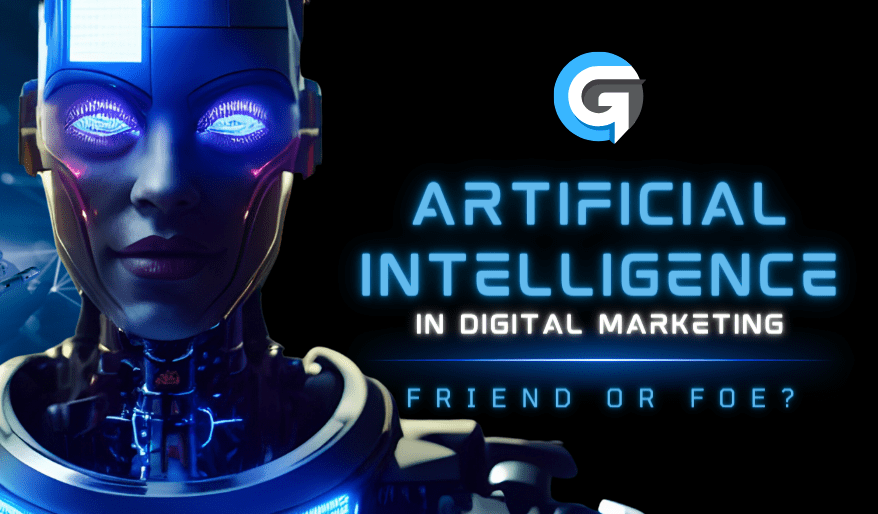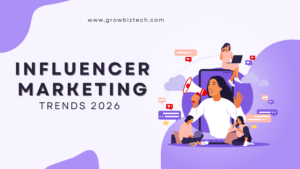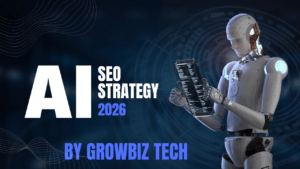The Future is Here: Role of Artificial Intelligence in Digital Marketing Revolution
In today’s fast-paced digital era, Artificial Intelligence (AI) has emerged as a game-changer, revolutionizing various industries. And one industry that has been significantly impacted by Artificial Intelligence is Digital Marketing. Brands are now harnessing the power of AI to gain a competitive edge by delivering personalized experiences and optimizing marketing strategies. In this article, we will explore the role of AI in the digital marketing revolution and how it is shaping the future of the industry.
By leveraging AI algorithms and machine learning capabilities, marketers can now analyse massive amounts of data with unparalleled speed and accuracy. This enables them to understand consumer behaviour, identify trends, and make data-driven decisions in real-time. From Chatbot that provide instant customer support to smart recommendations that enhance user experiences, AI is transforming the way brands engage with their audience.
Moreover, AI-powered tools can automate repetitive tasks, freeing up valuable time for marketers to focus on creativity and strategy. The ability to automate processes like content creation, data analysis, and campaign optimization allows marketers to work smarter, not harder.
As AI continues to evolve, it is poised to revolutionize digital marketing even further, unlocking new possibilities and opportunities for brands to connect with their target audience in more meaningful ways. The future of digital marketing is here, and AI is at the forefront of this exciting revolution, driving innovation and reshaping the way brands communicate with their customers.
How Artificial Intelligence is Transforming Digital Marketing
Artificial Intelligence (AI) is transforming the landscape of digital marketing, allowing marketers to leverage advanced algorithms and machine learning capabilities to analyse massive amounts of data with unparalleled speed and accuracy. This enables them to understand consumer behaviour, identify trends, and make data-driven decisions in real-time. AI-powered tools have become essential for marketers looking to keep up with the ever-changing digital landscape.
- Automation: One of the key ways AI is transforming digital marketing is through automation. AI-powered tools can automate repetitive tasks, freeing up valuable time for marketers to focus on creativity and strategy. Processes like content creation, data analysis, and campaign optimization can now be streamlined and executed with precision, allowing marketers to work smarter, not harder. With AI handling the mundane tasks, marketers can dedicate their time and expertise to developing innovative strategies and creating engaging content.
- Personalization: Furthermore, AI has revolutionized customer segmentation and targeting. With AI algorithms, marketers can analyse vast amounts of customer data to identify patterns and preferences. This allows for hyper-personalized marketing campaigns that resonate with individual customers on a deeper level. By delivering personalized experiences, brands can enhance customer satisfaction, increase brand loyalty, and ultimately drive conversions.
- Engagement: In addition to automation and personalization, AI has also transformed the way brands engage with their audience. Chatbot, powered by AI, provide instant customer support, answering queries and providing assistance 24/7. These intelligent bots can understand natural language and provide relevant answers, making customer interactions seamless and efficient. By implementing Chatbot, brands can improve customer satisfaction and reduce response times, leading to better overall customer experiences.
Benefits of Using Artificial Intelligence in Digital Marketing
The use of artificial intelligence in digital marketing offers numerous benefits for brands looking to stay ahead in the competitive landscape.
- Data Analysis: One of the key advantages of AI is the ability to process vast amounts of data quickly and accurately. With AI algorithms, marketers can analyse customer data, website analytics, and social media interactions in real-time, providing valuable insights that can inform marketing strategies and decision-making.
Audience Targeting: Another benefit of AI in digital marketing is improved targeting and segmentation. By leveraging AI algorithms, marketers can identify specific customer segments based on their preferences, behaviours, and demographics. This allows for highly targeted marketing campaigns that are more likely to resonate with the intended audience, leading to higher conversion rates and ROI. - Task Automation: AI also enables marketers to automate repetitive tasks, saving time and resources. Processes like content creation, data analysis, and campaign optimization can be automated, freeing up marketers to focus on more strategic initiatives. This not only increases efficiency but also allows for better resource allocation, ensuring that marketers can make the most of their time and efforts.
- User Experience: Furthermore, AI-powered tools can enhance the customer experience by providing personalized recommendations and tailored content. By analysing customer data, AI algorithms can understand individual preferences and deliver targeted recommendations that cater to each customer’s unique needs. This level of personalization not only improves customer satisfaction but also increases the likelihood of conversions and repeat purchases.
The rise of AI in digital marketing has brought forth a plethora of powerful tools and platforms that can assist marketers in optimizing their strategies and campaigns. These tools leverage AI algorithms and machine learning capabilities to deliver actionable insights and automate various marketing processes.
One widely used AI tool is marketing automation software. This software automates repetitive marketing tasks such as email marketing, social media scheduling, and lead nurturing. By automating these tasks, marketers can save time and resources, while also ensuring consistent and timely communication with their audience.
Another popular AI tool for digital marketers is predictive analytics software. This software uses AI algorithms to analyse historical data, identify patterns, and make predictions about future customer behaviour. By leveraging predictive analytics, marketers can anticipate customer needs and preferences, allowing them to tailor their marketing efforts and deliver the right message at the right time.
Additionally, AI-powered Chatbot have gained significant popularity in recent years. These intelligent bots can understand natural language and engage in conversations with customers, providing instant support and assistance. Chatbot can be integrated into websites, social media platforms, and messaging apps, allowing brands to offer round-the-clock customer service and improve overall customer experiences.
Personalization has become a key focus for marketers in the digital age, and AI plays a crucial role in enabling personalized experiences at scale. By leveraging AI algorithms, marketers can analyse vast amounts of customer data to understand individual preferences, behaviours, and purchase history. This allows them to deliver highly targeted and tailored marketing messages that resonate with each customer.
With AI-powered personalization, brands can create dynamic content that adapts to each customer’s unique journey. Websites, emails, and advertisements can be customized in real-time based on individual preferences, increasing engagement and conversion rates. By delivering personalized experiences, brands can foster stronger connections with their audience and build long-lasting relationships.
Furthermore, AI-powered personalization extends beyond just content. It also encompasses personalized product recommendations, pricing, and offers. By analysing customer data, AI algorithms can understand individual preferences and make recommendations that cater to each customer’s specific needs and interests. This level of personalization not only enhances the customer experience but also increases the likelihood of conversions and repeat purchases.
In addition to personalization, AI-powered Chatbot have revolutionized customer service and support. These intelligent bots can understand natural language and engage in conversations with customers, providing instant assistance and resolving queries. By implementing Chatbot, brands can improve response times, reduce customer frustration, and provide round-the-clock support, leading to better overall customer experiences.
Predictive analytics, powered by AI, has become a game-changer in digital marketing. By analysing historical data and identifying patterns, predictive analytics can make accurate predictions about future customer behaviour. This allows marketers to anticipate customer needs and preferences, enabling them to tailor their marketing efforts and deliver the right message at the right time.
With predictive analytics, marketers can optimize their marketing campaigns by identifying the most effective channels, messages, and offers. By analysing past campaign data, AI algorithms can identify trends and patterns that lead to successful conversions. This allows marketers to allocate their resources more effectively, ensuring maximum ROI and minimizing wasted efforts.
Moreover, predictive analytics can help marketers identify potential churn or attrition risks. By analysing customer data and identifying patterns associated with customers who have churned in the past, AI algorithms can predict which customers are at a higher risk of leaving. This allows marketers to proactively intervene and implement retention strategies to prevent customer churn.
Additionally, predictive analytics can assist in lead scoring and lead nurturing. By analysing customer data and behaviours, AI algorithms can assign a score to each lead, indicating their likelihood to convert. This allows marketers to prioritize leads and focus their efforts on the most promising prospects, increasing the efficiency of lead generation and nurturing efforts.
Challenges and Limitations of Artificial Intelligence in Digital Marketing
While AI offers numerous benefits for digital marketers, it also comes with its own set of challenges and limitations.
- Quality Data: One of the main challenges is the need for high-quality data. AI algorithms rely heavily on data to make accurate predictions and deliver personalized experiences. Without clean and reliable data, the effectiveness of AI-powered tools and strategies can be compromised.
Ethical - Considerations: Another challenge is the ethical considerations surrounding AI in digital marketing. Marketers need to ensure that AI algorithms are designed and implemented in an ethical and responsible manner. This includes being transparent about data collection and usage, respecting user privacy, and avoiding bias in decision-making. Failure to address these ethical concerns can lead to negative brand perception and legal consequences.
- Reliability: Additionally, AI algorithms are not infallible and can sometimes make mistakes. This can result in inaccurate predictions, flawed personalization, or inappropriate responses from Chatbot. It is crucial for marketers to regularly monitor and fine-tune AI algorithms to ensure optimal performance and prevent any unintended consequences.
- Budget Limitations: AI-powered tools and platforms can be expensive to implement and maintain. Small businesses with limited budgets may find it challenging to invest in AI technology. However, as AI continues to evolve and become more accessible, the cost barrier is likely to decrease, making it more feasible for businesses of all sizes to leverage AI in their digital marketing efforts.
Ethical Considerations in the Use of Artificial Intelligence in Digital Marketing
As the use of AI in digital marketing becomes more prevalent, it is essential for marketers to pay attention to the ethical considerations associated with its use. Marketers need to ensure that AI algorithms are designed and implemented in a responsible and ethical manner, prioritizing user privacy and transparency.
- Transparency: Transparency is a key ethical consideration when it comes to AI in digital marketing. Marketers should be transparent about the data they collect and how it is used. Clear and concise privacy policies should be provided to users, explaining what data is collected, how it is processed, and how it is protected. By being transparent, brands can build trust with their customers and alleviate any concerns about data privacy.
Unbiased - Algorithms: Another ethical consideration is the potential for bias in AI algorithms. AI algorithms are trained on historical data, which can sometimes contain bias. It is crucial for marketers to ensure that their AI algorithms are unbiased and do not perpetuate discrimination or reinforce stereotypes. Regular audits and reviews of AI algorithms can help identify and address any biases that may exist.
- User Privacy: Furthermore, marketers need to respect user privacy when using AI-powered tools and platforms. User consent should be obtained for data collection and usage, and data should be stored and protected in compliance with relevant data protection regulations. By respecting user privacy, marketers can build trust with their audience and maintain a positive brand image.
Impact on - Employment: Lastly, marketers should be mindful of the impact of AI on employment and job displacement. While AI can automate repetitive tasks and enhance efficiency, it can also lead to job losses in certain areas. It is important for marketers to consider the social implications of AI implementation and invest in up skilling and reskilling programs to ensure a smooth transition for employees.
Future Trends and Possibilities of Artificial Intelligence in Digital Marketing
As AI continues to evolve, the future of digital marketing looks promising, with numerous trends and possibilities on the horizon.
- AI Integration: One trend is the further integration of AI-powered Chatbot and virtual assistants. These intelligent bots will become even more sophisticated, offering more personalized and human-like interactions with customers. This will enhance customer experiences and improve overall satisfaction.
- Voice Search: Another trend is the rise of voice search and voice-activated devices. With the increasing popularity of virtual assistants like Siri, Alexa, and Google Assistant, marketers need to optimize their content for voice search. AI algorithms will play a crucial role in understanding natural language queries and delivering relevant results, making voice search an important aspect of SEO and digital marketing strategies.
- Predictive Analytics: Moreover, AI-powered predictive analytics will become more advanced, enabling marketers to make even more accurate predictions about customer behaviour. This will allow for more precise targeting and personalization, leading to higher conversion rates and improved ROI. AI will also continue to automate various marketing processes, freeing up marketers to focus on strategy and creativity.
- Visual Search: Additionally, AI will play a significant role in visual search. With the rise of platforms like Interest and Google Lens, visual search is becoming increasingly popular. AI algorithms can analyse images and identify objects, allowing marketers to deliver more relevant and targeted content based on visual cues. This opens up new possibilities for product discovery and personalized recommendations.
- Content Creation: Lastly, AI will continue to shape the future of content creation. AI algorithms can already generate basic content, such as news articles and product descriptions. As AI evolves, we can expect more advanced content generation capabilities, allowing marketers to automate content creation while maintaining quality and relevance.
Embracing the Digital Marketing Revolution with Artificial Intelligence
The future of digital marketing is here, and AI is at the forefront of this exciting revolution. By leveraging AI algorithms and machine learning capabilities, marketers can analyse massive amounts of data, automate repetitive tasks, and deliver personalized experiences at scale. AI is transforming the way brands engage with their audience, enabling them to make data-driven decisions, optimize marketing strategies, and enhance customer experiences.
While AI offers numerous benefits for digital marketers, it also comes with its own set of challenges and ethical considerations. Marketers need to ensure that AI algorithms are designed and implemented in an ethical and responsible manner, prioritizing user privacy, transparency, and fairness. By addressing these challenges and embracing the possibilities of AI, marketers can stay ahead in the competitive digital landscape and unlock new opportunities for growth and success. The future is here, and AI is paving the way for a digital marketing revolution like never before.





